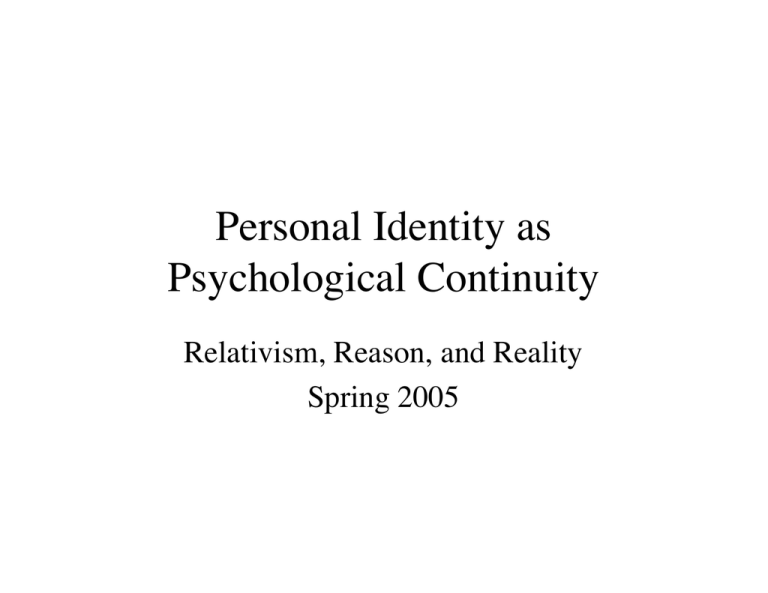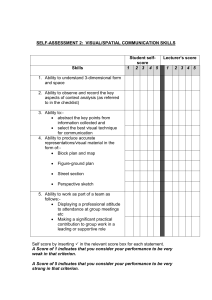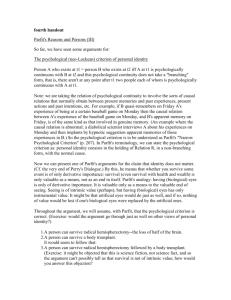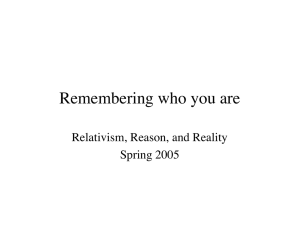Document 13519481
advertisement

Personal Identity as Psychological Continuity Relativism, Reason, and Reality Spring 2005 Parfit is a Reductionist This involves two claims (p210) 1. the fact of a person's identity over time just consists in the holding of certain more particular facts 2. these facts can be described in an impersonal way A shocking (?) corollary "If we accept a Reductionist View, there may be cases where we believe the identity of …a thing to be… indeterminate" (213) He gives the analogy of a nation or a club. Is today's Germany the same country as pre war Germany? Why does indeterminacy follow? Reductionists think a later person = an earlier one iff a bunch of more particular lower-level facts meet such and such conditions. The conditions are going to be vague -what else? But then there will sometimes be no fact of the matter as to whether they're satisfied. A mistaken view of ourselves "[imagine] something unusual is about to happen….most of us are inclined to believe that…the question "Am I about to die?" must have a [Yes or No] answer" (216) Do we have this belief, what he calls belief in the determinacy of identity? Are we wrong to have it? Why might it be hard to give the belief up? Williams rejects all this • Bernard Williams denies that psychological continuity is required. The same functioning brain ("physical identity") is enough. He gives a slippery slope argument (p229). • I will have a painful operation. Do I dread it? Yes. What if the surgeon first steals my memories? That's even worse. What if during the pain he gives me seeming memories of being Napoleon? Just as bad. What if he gives me Napoleon's character? It will still be me who's in agony. • This "seems to refute the Psychological Criterion" (p230). • It also casts doubt on Reductionism; same brain is (arguably) all or nothing. Parfit's first reply • Reimagine the argument as involving a milliion small steps, each a bit more psychologically disruptive than the last (the Psychological Spectrum) • Then it starts to look like a well known fallacy. A person with 0 hairs is bald; if a person with n hairs is bald so is a person with n+1 hairs; so everyone is bald. (Sorites Argument.) • The "fallacy" is to assume it must be determinate whether B is bald, and also whether B = A. • Is this plausible as a diagnosis of Williams' objection? No, since none of his cases seem borderline. Parfit's second reply • Run the same argument against The Physical Criterion; first we replace 1% of the brain, then 2%, ….then 100%. (This is the Physical Spectrum.) The resulting person is still me, if psychologically continuous with me. • It seems that physical identity, psychological continuity are both enough for personal identity, even in the absence of the other! Parfit's third reply • Now imagine a range of cases where we change physical and psychological characteristics at the same time: 1%, 2%, etc….100%. (The Combined Spectrum.) The series converges on Greta Garbo (p236-7). • "It could not be clearer that in this case, the resulting person would not be me" (p238). • This forces us (even Williams) to accept borderline cases, and so Reductionism. • But it doesn’t at all force us (or Williams) to rethink his objection to the psychological criterion. Where does this leave us? • The first two Spectra seemed to show that neither psychological continuity nor persistence of brain is necessary for PI; either would do without the other. • So what is our theory of PI? • "I shall argue that if we are Reductioinists, we should not try to decide between the different criteria of PI" (p241). What? Why not? No further fact • Consider Teletransportation: "we could say [with the Wide Psychological Criterion] that my Replica will be me, or [with the Physical Criterion] that he will be someone else who is exactly like me. For these to be competing hypotheses about what will happen, my continued existence must involve a further fact." • He suggests that in the absence of a further fact, the question of which which Criterion is correct is an empty question. It's up to us what to say. But hold on • There is no further fact of bachelorhood either, over and above the facts of marriage, gender, age, and so on. • That doesn't mean questions about the proper analysis of bachelorhood are empty! • On the contrary, some criteria are clearly better than others, because truer to what we mean by bachelor. • It is not empty to ask: Is the Psychological Criterion better than the Physical Criterion? Is some third criterion better than both? Parfit changes the topic • Whether for good reason or not (not!), Parfit now (at the end ch. 11) loses interest in the question of what PI is. • This is because, as the title of ch. 12 says, "Identity is not what matters." • Read ch. 12; try to figure out what he means by this and what his evidence is





